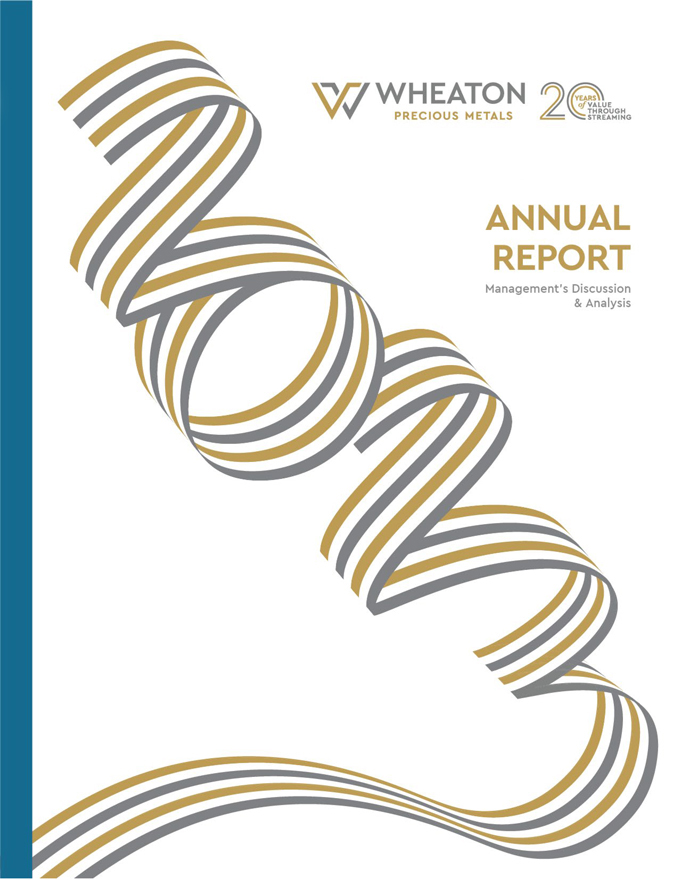Information Systems, Cyber Security: Compromises or breaches of the Company’s data or information systems could result in material losses to the Company
Wheaton’s information systems, and those of its counterparties under the PMPAs, third-party service providers and vendors, are vulnerable to an increasing threat of continually evolving information systems and cyber security risks. Unauthorized parties may attempt to gain access to these systems or the Company’s information through fraud or other means of deceiving the Company’s counterparties under its PMPAs, third-party service providers or vendors.
Wheaton’s operations depend, in part, on how well Wheaton and its suppliers, as well as counterparties under the PMPAs, protect networks, equipment, information technology (“IT”) systems and software against damage from a number of threats. Wheaton has entered into agreements with third parties for hardware, software, telecommunications and other services in connection with its operations. The Company’s operations and Mining Operations also depend on the timely maintenance, upgrade and replacement of networks, equipment, IT systems, applications and software, as well as pre-emptive expenses to mitigate the risks of failures. Any of these and other events could result in information system failures, delays and/or increases in capital and remediation expenditures. The failure of information systems or a component of information systems could, depending on the nature of any such failure, adversely impact the Company’s reputation and results of operations.
Although to date the Company has not experienced any known material losses relating to cyber-attacks or other data / information security breaches, there can be no assurance that Wheaton will not incur such losses in the future. The Company’s risk and exposure to these matters cannot be fully mitigated because of, among other things, the evolving nature of these threats. As a result, cyber security and the continued development and enhancement of controls, processes and practices designed to protect systems, computers, software, data and networks from attack, damage or unauthorized access remain a priority.
Any future significant compromise or breach of the Company’s data / information security, whether external or internal, or misuse of data or information, could result in additional significant costs, lost sales, fines and lawsuits, unauthorized transactions, inappropriate disclosures, and damage to the Company’s reputation. In addition, as the regulatory environment related to data / information security, data collection and use, and privacy becomes increasingly rigorous, with new and constantly changing requirements applicable to Wheaton’s business and counterparties to the PMPAs, compliance with those requirements could also result in additional costs. As cyber threats continue to evolve, the Company or its counterparties may be required to expend additional resources to continue to modify or enhance protective measures or to investigate and remediate any security vulnerabilities.
Generative Artificial Intelligence: The Company may not successfully adopt or respond to generative artificial intelligence
New technological advances, including the use of generative artificial intelligence (“Generative AI”), are evolving rapidly. The successful development, adoption and monitoring of Generative AI at the Company may require significant additional resources and costs. The Company’s consideration of the value of Generative AI in its business will require assessments of opportunities for its use, as well as the quality, limitations, vulnerabilities and potential legal and regulatory concerns, as well as enhanced controls, processes and practices designed to address challenges. In addition, if the Company uses or adopts Generative AI in the future, the availability of intellectual property protection is uncertain.
Finally, Generative AI could be used by the Company’s competitors to obtain a competitive advantage over the Company and could adversely impact the Company’s results of operations.
Legal Risks: The Company is subject to anti-corruption and anti-bribery laws and regulations which could result in liability and require the Company to incur costs
The Company is subject to the Canadian Corruption of Foreign Public Officials Act, the U.S. Foreign Corrupt Practices Act, the UK Bribery Act and other laws that prohibit improper payments or offers of payments to third parties, including foreign governments and their officials, for the purpose of obtaining or retaining business. In some cases, the Company invests in Mining Operations in certain jurisdictions where corruption may be more common, which can increase the risk of unauthorized payments or offers of payments in violation of anti-corruption and anti-bribery laws and regulations and in violation of our policies. In addition, the operators of the Mining Operations may fail to comply with anti-corruption and anti-bribery laws and regulations. Although the Company does not operate the Mining Operations, enforcement authorities could deem us to have some culpability for the operators’ actions. Any violations of the applicable anti-corruption and anti-bribery laws could result in significant civil or criminal penalties to us and could have an adverse effect on our reputation.
Regulatory: The Company’s business is subject to evolving corporate governance and public disclosure regulation that have increased compliance costs and the risk of non-compliance
The Company is subject to changing rules and regulations promulgated by a number of Canadian, United States and United Kingdom governmental and self-regulated organizations, including the Canadian Securities Administrators, the SEC, the FCA, the NYSE, the TSX, the LSE, the International Accounting Standards Board and the Financial Accounting Standards Board. These rules and regulations continue to evolve in scope and complexity making
WHEATON PRECIOUS METALS 2023 ANNUAL REPORT - MANAGEMENT DISCUSSION & ANALYSIS [56]

